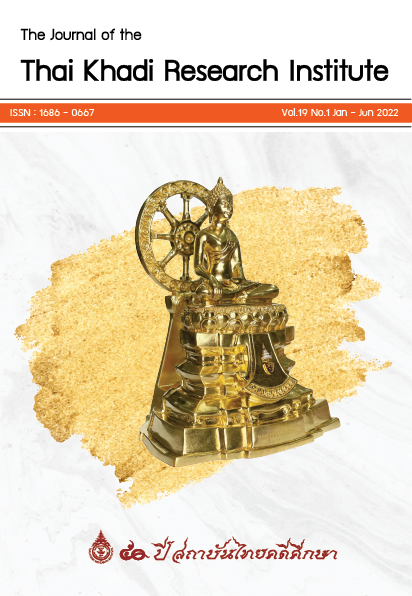การสร้างมูลค่าเพิ่มให้กับการท่องเที่ยว ด้านอาหาร ผ่านกระบวนการการเรียน การสอนทำอาหารไทยเพื่อการท่องเที่ยว
Main Article Content
บทคัดย่อ
เป็นการวิจัยที่มีวัตถุประสงค์เพื่อรวบรวมสูตรอาหารชาววัง และศึกษากระบวนการการเรียนการสอนทำอาหารสำหรับนักท่องเที่ยว โดยใช้แนวคิดเรื่องการท่องเที่ยวด้านอาหาร (Gastronomy Tourism) มาใช้อธิบายในส่วนของประเภทการท่องเที่ยวและกระแสความนิยมของนักท่องเที่ยวต่อการท่องเที่ยวประเภทต่าง ๆ และใช้แนวคิดเรื่องระบบการท่องเที่ยว (The Tourism System) อธิบายถึงพฤติกรรมของตลาด หรือผู้บริโภคที่มีผลต่อการท่องเที่ยว ซึ่งเป็นผลให้รูปแบบการท่องเที่ยว หรือรูปแบบการให้บริการด้านการท่องเที่ยวนั้นต้องปรับตัวให้เข้ากับพฤติกรรมของนักท่องเที่ยว
ผลการศึกษาพบว่า สูตรอาหารตำรับชาววังกับสูตรอาหารในตำราอาหารที่เป็นมรดกภูมิปัญญาทางวัฒนธรรม (Intangible Cultural Heritage) นั้น ในบางรายการถึงแม้จะมีชื่อเรียกที่ต่างกันแต่ในส่วนของวัตถุดิบ และวิธีการทำมีความเหมือนกัน อาหารในบางรายการมีการปรับในส่วนของวัตถุดิบ รวมถึงวิธีการทำที่ต่างจากตำรับอาหารชาววังเป็นอย่างมาก เมื่อนำสูตรอาหาร และขนมตำรับชาววังมาเทียบเคียงกับสูตรที่สถานที่สาธิตสอนทำอาหารนำมาใช้สาธิตให้กับนักท่องเที่ยว พบว่าในอาหารบางรายการโดยเฉพาะขนมหวานจะมีการปรับสูตรให้มีขั้นตอน และวัตถุดิบที่น้อยลง ในส่วนของผลการศึกษาเรื่องกระบวนการการเรียนการสอน พบว่า สถานที่สาธิตสอนทำอาหารกลุ่มตัวอย่างมีกระบวนการการเรียนการสอนที่แตกต่างกันออกไป กลุ่มตัวอย่าง 1 ใน 5 แห่ง มีความพยายามที่จะเล่าถึงตำนานความเชื่อต่าง ๆ ที่เกี่ยวกับอาหารให้กับผู้เรียนได้รับรู้ แต่อย่างไรก็ตามยังไม่สามารถถือเป็นชุดข้อมูลประวัติศาสตร์อาหารได้ นอกจากนี้พบว่ากลุ่มตัวอย่างสถานที่สาธิตสอนทำอาหาร 1 ใน 5 แห่ง มีการพาผู้เรียนออกไปซื้อวัตถุดิบที่ตลาด เพื่อให้ผู้เรียนได้มีโอกาสสัมผัสวิถีชีวิต และได้เห็นถึงบรรยากาศของตลาดในเมืองไทย ซึ่งผู้เรียนที่เป็นชาวต่างชาติมีความชื่นชอบกิจกรรมดังกล่าวเป็นอย่างมาก การศึกษานี้คาดหวังว่าจะเป็นประโยชน์ต่อธุรกิจสาธิตสอนทำอาหารเพื่อนักท่องเที่ยว และสามารถนำมาปรับใช้เพื่อเพิ่มมูลค่าให้กับการท่องเที่ยวด้านอาหารได้
Downloads
Article Details

อนุญาตภายใต้เงื่อนไข Creative Commons Attribution-NonCommercial-NoDerivatives 4.0 International License.
ผู้เขียนจะต้องลงนามในแบบฟอร์มรับรองบทความ เพื่อให้คำยืนยันความรับผิดชอบว่า บทความของผู้เขียนนั้นไม่เคยตีพิมพ์ที่ใดมาก่อน พร้อมรับทราบว่า กระบวนการส่งบทความเข้าพิจารณาและตีพิมพ์ในวารสารไทยคดีศึกษานั้น จะไม่มีการเรียกเก็บค่าใช้จ่ายในการดำเนินการ ยกเว้น ในกรณีที่ผู้เขียนขอยกเลิกการตีพิมพ์บทความในวารสารไทยคดีศึกษาไม่ว่าด้วยสาเหตุใด และหลังจากบทความนั้นเข้าสู่กระบวนการพิจารณาของผู้ทรงคุณวุฒิไปแล้ว ผู้เขียนจะต้องรับผิดชอบต่อค่าใช้จ่ายที่เกิดขึ้นในกระบวนการประเมินเป็นจำนวนเงิน 3,000 บาท (สามพันบาทถ้วน)
เอกสารอ้างอิง
Aneksuk, B. (2017). การท่องเที่ยวแบบเนิบช้า [Slow Travel]. Retrieved Febuary 2, 2020, from https://www.ubu.ac.th/web/files_up/08f201711 1116234939.pdf.
Anekphunsuk, B. (2017). Food on the Move. Retrieved Febuary 2, 2020, from https://issuu.com/etatjournal/docs/tat_12017.
Chunlachomklao, H.M. (2013). พระราชพิธี 12 เดือน [12 Months of Royal Ceremony]. Bangkok: Saengdao Publishing Co., Ltd.
Department of Cultural Promotion. (2017). คู่มือการเสนอขอขึ้นทะเบียนมรดกภูมิปัญญาทางวัฒนธรรมของชาติ [The National Inventory of Intangible Cutural Heritage]. Bangkok: WVO Officer of Printing Mill.
Fine Art Department. (2004). บันทึกเรื่องมิสซังแห่งกรุงสยาม [Priest in Siam]. Bangkok: Mark & Twain Medias Co.,Ltd.
Khongpun, S. (2018). อาหารขึ้นทะเบียนมรดกภูมิปัญญาทางวัฒนธรรมของชาติ [Thai Food The National Inventory of Intangible Cutural Herotage]. Bangkok: WVO Officer of Printing Mill.
Sinlapaserot, N. (2017). อุตสาหกรรมการท่องเที่ยว [Tourism Industry]. Bangkok: Chulalongkorn University Press.
Likhitpornsawan, T. (ed.). (2014). ตำราแม่ครัวหัวป่าก์ [Text Book of Chef]. Bangkok: Sataporn Books Co.,Ltd.
Sukpricha, T. (2017). Food Tourism 2.0. Retrieved Febuary 2, 2020, from https://issuu.com/etatjournal/docs/tat_12017.
Kritsanaprakornakit, W. (2017). FOODIE: Food Tourism Trend. Retrieved Febuary 2, 2020, from https://issuu.com/etatjournal/docs/tat_12017.
Osatharom, W. et al. (2013). ศักยภาพและการพัฒนาองค์กรเครือข่ายทางวัฒนธรรมเพื่อการท่องเที่ยวเชิงวัฒนธรรมอย่างยั่งยืน: ถอดบทเรียนพัฒนาการ และวิเคราะห์กระบวนการเครือข่ายผ่านกิจกรรมทางวัฒนธรรม 4 กรณีศึกษา [The Potential and Development of Cultural Network Organizations for Sustainable Cultural Tourism: Lessons from 4 Case Studies]. The Journal of Thai Khadi Research Institute, 11(1), 127 - 198.


